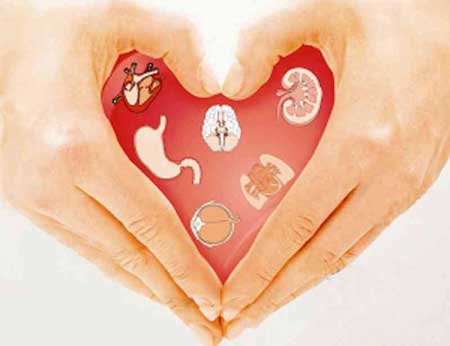 |
|
Computer to prioritize patients according to their medical needs. |
|
Computer to prioritize patients according to their medical needs The top health authority is set to issue a regulation ordering mandatory use of a computerized organ allocation system by hospitals in a bid to ensure transparent and fair allocation of organ donations, according to a senior official. Huang Jiefu, former vice-minister of health, told China Daily in an exclusive interview that the regulation will enhance the efficiency of organ sharing and save more needy patients' lives. Huang, head of the organ transplant committee of the National Health and Family Planning Commission, made the comments in response to concerns over fairness after reports said that only one-third of the nation's public organ donations had been allocated by the system. "Organ allocation is in fact life allocation, and people won't donate without fair practices," he said. Wang Haibo, director of the China Organ Transplant Response System Research Center at the University of Hong Kong, said the policy was developed after research based on dozens of countries' allocation policies and several discussions with Chinese experts and officials. "We are looking forward to the coming regulation being forceful and strong enough to better supervise donated organ procurement and allocation," he said. The computerized allocation system will automatically rank all waiting patients according to medical factors like disease severity, waiting time and distance from donors, then quickly single out the best recipient. "All out-of-system allocations will be banned, and hospitals caught with irregularities will face punishment including suspension from practice or even license revocation," he noted. Wang was on the national organ donation expert committee that drafted the regulation. China has so far realized at least 700 public organ donations from the deceased, according to Gao Xinpu, a division director of the National Organ Donation Management Center under the Red Cross Society of China. The Red Cross and the National Health and Family Planning Commission operate a national organ donation system to facilitate organ donations after death and to ease a serious shortage of organs for transplant. Gao said equipment limitations and poor awareness were the main reasons that only one-third of donations were allocated by the system. However, the other two-thirds were allocated according to similar principles, he pointed out. According to Gao, hospitals that detect donors and obtain donations are now favored during the allocation.
|
前衛(wèi)生部(現(xiàn)衛(wèi)生與計劃生育委員會)副部長黃潔夫日前在接受中國日報采訪時透露,衛(wèi)生行政部門將推行新政,強制要求各移植醫(yī)院使用統(tǒng)一的器官分配系統(tǒng),以保證移植用器官分配的公開,公平,和公正。 這套分配系統(tǒng)是一個自動化計算機系統(tǒng),嚴格遵循國家分配政策。諸如病人病情,和捐獻者的距離遠近,病人等待時間等因素都被納入分配考量。 據(jù)統(tǒng)計,經(jīng)分配系統(tǒng)進行分配,從錄入供者信息后觸發(fā)分配,到器官真正被分配到等待者身上,整個分配過程平均用時26分鐘,其中匹配環(huán)節(jié)的平均時間僅為0.96秒。整個過程完全排除了人為干擾。 黃潔夫表示,器官的分配其實是生命的分配。沒有公正的分配,就沒有公民的器官捐獻。 據(jù)他介紹,衛(wèi)生和計劃生育委員會正在醞釀出臺器官分配與獲取管理辦法,擬強制要求所有捐獻器官進入中國器官分配與共享系統(tǒng),按照病情緩急、地域遠近、年齡老幼等國家捐獻器官分配原則,在全國器官移植的登記等待患者中,進行公平的自動分配。 “這一新規(guī)對于確保國家分配政策的實施和公正的器官分配,提高捐獻器官的使用效率,挽救更多亟待器官移植病人的生命,十分重要,”黃說。 反觀目前的現(xiàn)實,我國已實施人體器官捐獻超過700例,僅1/3捐獻器官進入中國器官分配與共享系統(tǒng)中進行分配。這一數(shù)字是中國人體器官捐獻管理中心業(yè)務(wù)部副部長高新譜向媒體透露的。 早在2011年,衛(wèi)生部就發(fā)布了關(guān)于器官分配和共享的相關(guān)政策,“但更多的是在技術(shù)層面,”這一系統(tǒng)的設(shè)計者、香港大學(xué)外科學(xué)系研究主任王海波說。 據(jù)他介紹,這一政策在出臺是相關(guān)專家學(xué)者長期研討的結(jié)果,它參考了別國先進經(jīng)驗,有390多頁。而政策的實現(xiàn),必須依靠統(tǒng)一的分配系統(tǒng)。 他說:“我們期待這一強制性措施的出臺來確保系統(tǒng)發(fā)揮作用,保證共平的器官分配”。 在這一政策下,醫(yī)院如被發(fā)現(xiàn)進行了系統(tǒng)外的器官分配將面臨包括停業(yè)甚或移植資質(zhì)被取消的處罰。 截止目前,中國已實施至少700例的公民身后自愿器官捐獻。為了緩解捐獻器官的緊缺,中國紅十字會和衛(wèi)生部在三年前共創(chuàng)建了公民器官捐獻系統(tǒng)。 據(jù)高新譜介紹,之所以只有三分之一的捐獻經(jīng)由系統(tǒng)進行分配,這主要是因為客觀條件限制和相關(guān)從業(yè)人員意識不足。 但是他同時指出,雖然沒有經(jīng)由系統(tǒng)分配,其余的器官分配也遵循了同樣的分配原則并且要在之后接受器官捐獻管理中心的審核。
|
|
|
